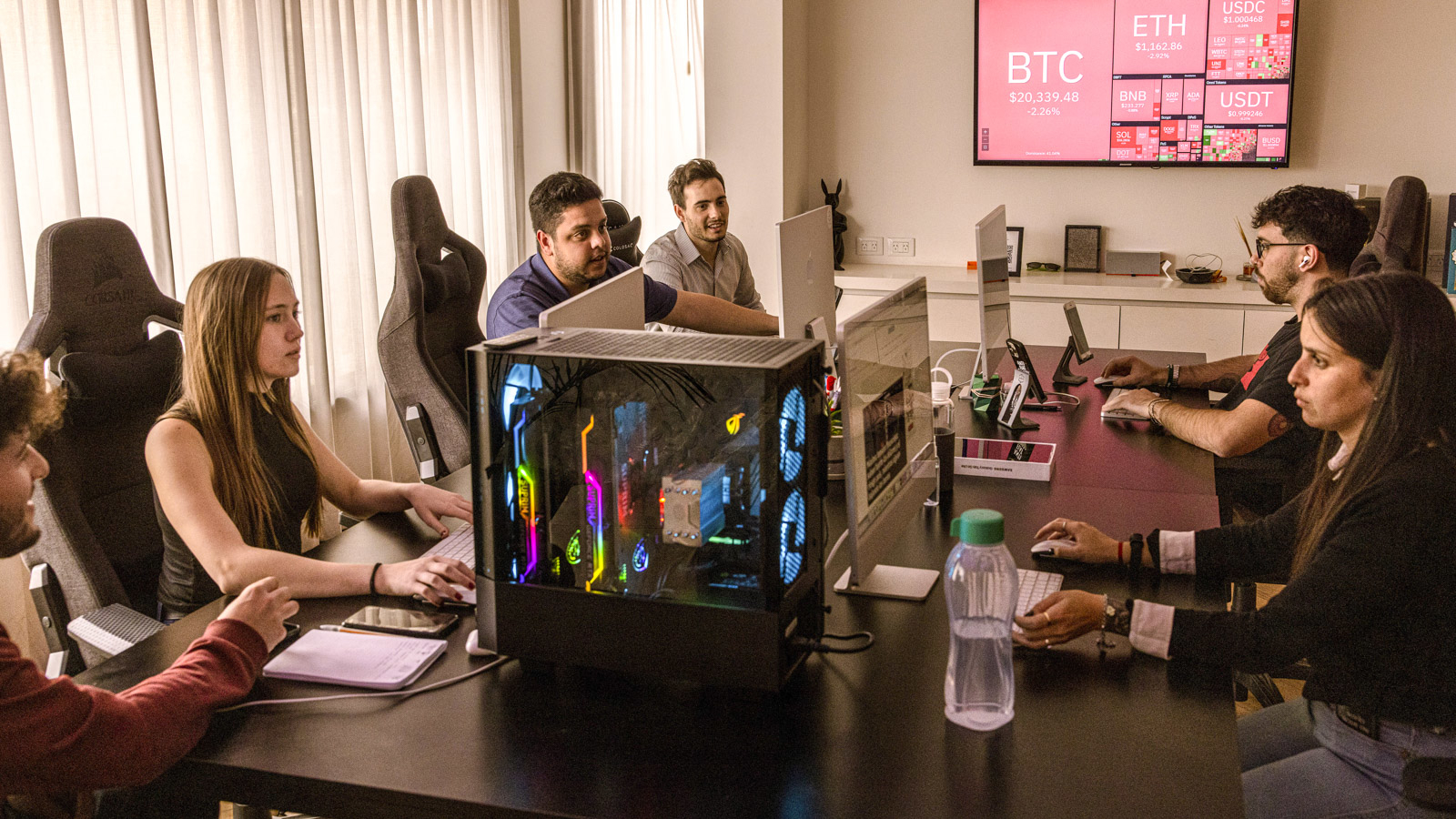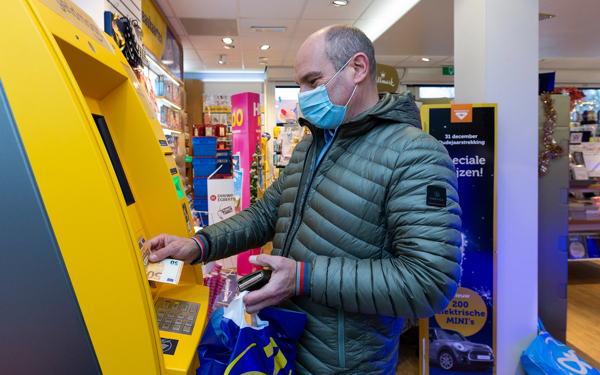At DNB, one of our core tasks is to ensure financial stability. Cryptos are a potential danger to this stability.
What are cryptos?
According to the European Commission’s definition, cryptos are a digital representation of value or rights which may be transferred and stored electronically, using distributed ledger technology, such as in a blockchain, or similar technology.
In a way, a crypto is an item recorded in a kind of digital ledger or register. These items are not stored centrally, but spread across several computers, using distributed ledger technology (DLT). There is no authority managing this process.
Backed and unbacked cryptos
We distinguish between backed and unbacked cryptos. Unbacked cryptos are values or rights that exist only in the DLT environment. They are nothing more than entries in a distributed ledger.
Conversely, unbacked cryptos represent underlying assets (values) that exist outside the distributed ledger. They are issued and purchased by parties that undertake to buy and sell the underlying backing assets in the traditional economic or financial system.
Unbacked cryptos are not suitable for use as money
We do not consider unbacked cryptos as money, as their prices are too volatile. Money functions as a means of payment, a store of value and a unit of account. Cryptos cannot perform these functions effectively.
The value of cryptos is highly uncertain because there are no underlying assets and there is no monetary authority that stabilises their value. Because there are so many different cryptos, with no links between them, they are also unsuitable as units of account. It would be very confusing to display prices in Bitcoin, Ether, Sol, Ada, XRP, etc. Users of crypto assets seem to be of the same opinion. A mere 3% of Dutch crypto holders say they have used them to purchase something in 2022.
Buying and selling cryptos
While unbacked cryptos are unsuitable as a means of payment, they are attractive for gambling. Despite warnings and the real risk of losing money, cryptos are becoming increasingly popular. In the summer of 2022, an estimated 14% of the Dutch population held cryptos. However uncertain they are, many people seem to be in fear of missing out.
Many types of cryptos are in circulation. New ones are introduced on a daily basis, while others disappear. Well-known cryptos are Bitcoin and Ether. There is no financial authority regulating their value.
Besides crypto developers, there are also brokers, trading platforms and various other types of service providers in the market. This whole infrastructure has been likened to an ecosystem. Because of its complexity, anonymity and unclear governance structures, this ecosystem seems more prone to market failure than traditional financial markets.
Anyone can create cryptos and enter the crypto market, which has all sorts of consequences. Risks of theft or of loss caused by deception or insider trading are not uncommon. The impression many consumers must have is one of the Wild West, with traders acting as trigger-happy “crypto cowboys”.
Risks for consumers
While cryptos cannot be considered a means of payment, they are not securities either, like shares in a company, or bonds. People who buy unbacked cryptos speculate on an increase in value. The large price fluctuations mean such increases may occur, but major losses are also possible. So unbacked crypto trading is more like gambling, and has similar risks:
- Unbacked cryptos have no fixed value.
- Cryptos are prone to theft (hacking).
- The crypto market is complex.
- There is no safety net to absorb big losses, in the way the deposit guarantee scheme helps out customers of a failing bank.
- The crypto market is currently not as closely supervised as other financial markets.
Consumer protection and education
There is currently little legislation to protect consumers when purchasing cryptos However, new legislation is forthcoming. Until then, DNB and the Dutch Authority for the Financial Markets (AFM) can only warn about the risks. In summer 2022, the Dutch Ministry of Finance launched a crypto education campaign for young people: Slim in Crypto - SIC - Wijzer in geldzaken
DNB and the AFM have different roles. DNB's main task is to ensure the stability of our financial system, while the AFM seeks to protect consumers from irresponsible risks. For cryptos, such protection is not yet sufficiently in place. Additional rules have been drafted in the European context, but they have not yet entered into force.
Risks, rules and supervision
The accessibility and anonymity of cryptos make them highly suitable for illicit purposes. There are significant risks in terms of money laundering, tax evasion, privacy and consumer protection.
We currently only supervise crypto parties under the Anti-Money Laundering and Anti-Terrorist Financing Act (Wet ter voorkoming van witwassen en financieren van terrorisme – Wwft) and the Sanctions Act (Sanctiewet – Sw). This means firms providing exchange services between virtual money (cryptos) and regular (fiat) money and custodial wallet providers must register with us. Insurers and banks are also subject to consumer protection and financial stability rules, but there are no such rules yet for crypto service providers.
While the future of cryptos is uncertain, they are here to stay. Crypto markets are changing, and regulation must move with those changes, but there will always be a time lag. We are researching this and we are working within national and international forums to develop standards for this new market so that it meets the same requirements as traditional financial markets.
New crypto legislation
It is the task of crypto regulation to mitigate the risks involved. Given that those risks present themselves internationally, they must be addressed internationally. The European Commission introduced a new act regulating the crypto market with effect from 30 June 2023, the Markets in Crypto Assets Regulation (MiCAR). National legislation to implement the Regulation is currently pending consultation.
Enhanced consumer protection
Under the new legislation, crypto providers are not allowed to sell overly risky or complex products, or knowingly misadvise buyers. Should a platform be hacked and cryptos stolen, providers must compensate their customers. Also, crypto service providers are not allowed to use their customers' assets for proprietary trading. In these ways, the new crypto legislation offers enhanced protection to consumers. But it does not cover all risks. Trading in crypto markets remains an unstable and risky affair, even after the introduction of the new crypto legislation. More information on crypto risks and how to handle cryptos wisely as a buyer can be found at www.slimincrypto.nl.
Changes in supervision
The new legislation will also intensify supervision. Currently, crypto companies must register with DNB, which checks whether they are taking sufficient action to prevent money laundering and assesses their directors. Under the new legislation, the AFM will supervise crypto firms. These firms must apply for a licence and their supervision will be stricter. Besides taking sufficient action to prevent money laundering, they must also comply with rules that prevent conflicts of interest, and they will be subject to checks to verify that their reserves are sufficient. DNB will supervise parties that issue stablecoins, checking whether their stablecoins are really stable and actually backed, for example by dollars or euros.








